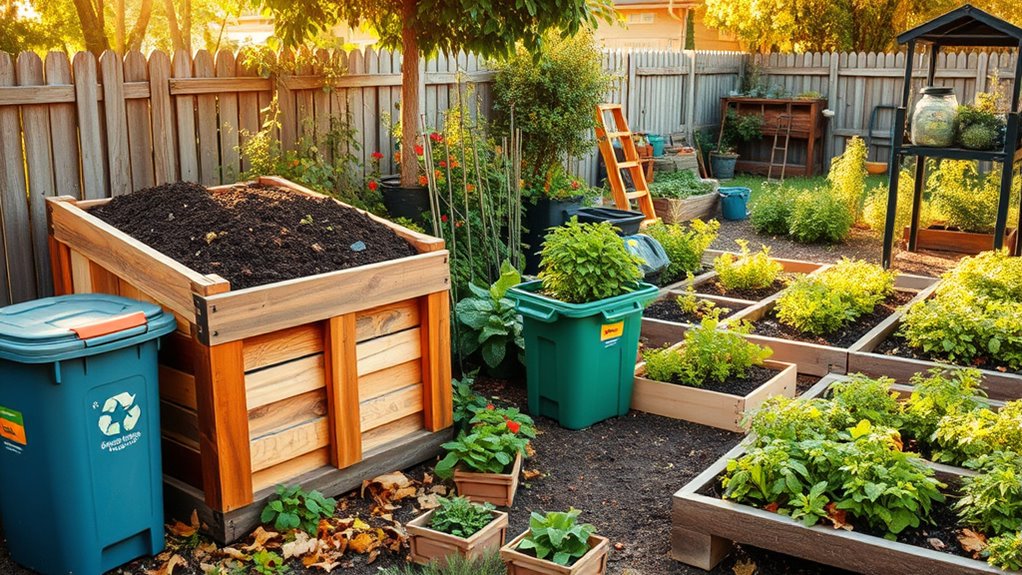Zero-waste gardening involves turning your kitchen scraps and yard waste into rich compost, reducing trash and chemical use. By choosing the right compost bin—like tumblers or layered bins—you guarantee good airflow, moisture, and pest control. Incorporate organic pest management and companion planting to maintain a healthy, eco-friendly garden. This cycle boosts soil health, supports sustainability, and minimizes environmental impact. Keep exploring to discover how to optimize your composting and recycling efforts even further.
Key Takeaways
- Composting transforms kitchen and yard waste into nutrient-rich soil, reducing landfill contributions and supporting sustainable gardening practices.
- Proper compost bin design ensures optimal airflow, moisture, and pest control, speeding up decomposition and maintaining a healthy garden ecosystem.
- Using organic pest control methods, like beneficial insects and companion planting, minimizes chemical use and promotes eco-friendly pest management.
- Recycling garden and kitchen waste closes the loop, creating a zero-waste system that enhances soil health and reduces environmental impact.
- Integrating composting with natural pest control fosters a sustainable, toxin-free garden environment supporting long-term ecological balance.

Have you ever wondered how your gardening habits can reduce waste and benefit the environment? One of the most effective ways to do this is by incorporating composting into your routine. The key is understanding compost bin design—this can make or break your composting success. A well-designed compost bin allows good airflow, moisture regulation, and easy access for turning the compost. You might choose a tumbler for convenience or a layered bin for larger quantities. Whatever style you prefer, ensuring proper ventilation and drainage helps speed up decomposition and keeps pests at bay. Using the right compost bin design encourages healthy microbial activity, turning kitchen scraps and yard waste into rich soil amendments. This not only cuts down on landfill waste but also reduces the need for chemical fertilizers, making your garden more eco-friendly. Additionally, selecting appropriate bin materials that resist rust and deterioration can extend the lifespan of your composting system and maintain optimal conditions for decomposition.
In addition to composting, practicing organic pest control plays a crucial role in zero-waste gardening. Instead of resorting to chemical pesticides, you can use natural methods like introducing beneficial insects, such as ladybugs or predatory nematodes, which prey on pests without harming your plants or the environment. Companion planting is another effective organic pest control technique—planting herbs like basil or marigolds alongside your vegetables can deter harmful insects naturally. Furthermore, homemade sprays using ingredients like neem oil, garlic, or chili peppers can keep pests away without introducing toxins into your garden ecosystem. These methods work harmoniously with composting, creating a sustainable cycle that minimizes waste and reduces reliance on synthetic chemicals.
Frequently Asked Questions
How Long Does It Take for Compost to Fully Decompose?
Compost typically takes anywhere from 3 to 6 months to fully decompose, depending on factors like compost temperature and material types. To speed up the decomposition timeline, you should guarantee your compost is kept moist and aerated, reaching a temperature of 130-160°F. Regularly turning the pile helps break down materials faster, so you’ll see rich, dark compost ready for use in your garden within this timeframe.
Can I Compost Meat or Dairy Products Safely at Home?
Think of your compost pile as a bustling city—meat composting and dairy waste management are the unpredictable traffic. You can compost meat and dairy at home, but they attract pests and create odors if not handled carefully. To keep your eco-city clean, bury these waste types deep in the pile, use a sealed bin, or opt for a composting system designed for meat and dairy. Safety and patience make the process smoother.
What Are the Best Plants for a Zero-Waste Garden?
You’re asking about the best plants for a zero-waste garden. Focus on native plants and drought-tolerant species, as they require less water and resources, reducing waste. Native plants thrive naturally in your environment, minimizing the need for fertilizers or pesticides. Drought-tolerant species adapt well to dry conditions, lowering your water consumption. Together, these choices help you create a sustainable, waste-free garden that supports local ecosystems and conserves resources.
How Do I Prevent Pests in My Compost Bin?
To prevent pests in your compost bin, focus on creating a pest-resistant compost. Keep meat, dairy, and oily foods out, as they attract pests. Use natural deterrents like crushed garlic or chili powder around the bin’s edges. Regularly turn your compost to aerate it and discourage pests. Cover fresh scraps with browns like leaves or straw, and make certain your bin has a tight lid to keep unwanted visitors out.
Are There Eco-Friendly Alternatives to Plastic Gardening Tools?
You’re wondering about eco-friendly alternatives to plastic gardening tools. You can opt for biodegradable tools made from natural materials like bamboo or wood, which break down over time and reduce plastic waste. Recycled garden implements, crafted from repurposed metals or plastics, also offer sustainable options. These eco-friendly tools help you minimize your environmental impact while maintaining an effective, eco-conscious gardening routine.
Conclusion
By embracing zero-waste gardening, you not only nurture your plants but also protect the planet. Composting and recycling at home reduce waste and enrich your soil naturally. Remember, every little bit helps—”Many hands make light work.” When you make sustainable choices, you’re planting seeds for a healthier future. So start today, and watch your garden—and the world—thrive with care and kindness.









